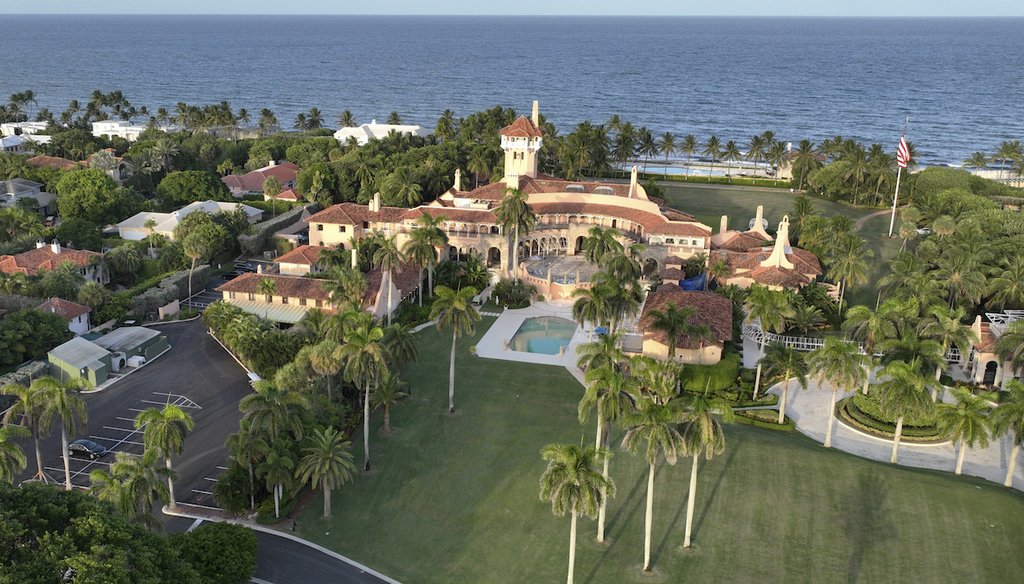Get PolitiFact in your inbox.

An aerial view of President Donald Trump's Mar-a-Lago estate in Palm Beach, Fla., on Aug. 10, 2022. (AP)
If Your Time is short
• The search warrant served on former President Donald Trump has raised some novel legal questions involving national-security classification.
• If the federal government pursues legal action against Trump over document laws, one obvious defense for Trump might be that he declassified these documents before leaving office.
• Sitting presidents do have wide powers to declassify documents, but they are supposed to go through a detailed procedure to do so.
• This case is so unprecedented that experts urge caution before projecting how courts may respond to such an argument.
The search warrant served on former President Donald Trump’s Mar-a-Lago home appears to involve documents that investigators say should not have remained in Trump’s possession after his presidency. This development has elevated some novel legal scenarios involving national-security classification.
Some of the papers in question may be ordinary presidential documents that fall under the Presidential Records Act of 1978. This law transferred ownership of presidential records to the U.S. government and established a record-keeping structure for presidents to use going forward.
However, a subset of documents being sought by the government might be classified for national security reasons. If so, a law known as Section 1924 could come into play. This provision says that knowingly removing classified documents with the intent to keep them in an unauthorized location is a crime.
If charges are ever brought under the latter law, one obvious defense for Trump might be that he declassified these documents before leaving office. If that was done, then no classified documents would mean no crime.
Is this realistic?
Legal experts say there’s reason to believe this legal argument won’t keep Trump out of legal peril — but they add that this is such an unusual case that it’s hard to rule out any eventuality.
Presidential declassification power
The president’s classification and declassification powers are broad.
The president, as commander in chief, is ultimately responsible for classification and declassification. When people lower in the chain of command handle classification and declassification duties — which is usually how it’s done — it’s because they have been delegated to do so by the president directly, or by an appointee chosen by the president.
The majority ruling in the 1988 Supreme Court case Department of Navy v. Egan — which involved the legal recourse of a Navy employee who had been denied a security clearance — addresses this line of authority.
"The president, after all, is the ‘Commander in Chief of the Army and Navy of the United States’" according to Article II of the Constitution, the court’s majority wrote. "His authority to classify and control access to information bearing on national security ... flows primarily from this constitutional investment of power in the president, and exists quite apart from any explicit congressional grant."
Steven Aftergood, director of the Federation of American Scientists Project on Government Secrecy, told PolitiFact in 2017 that such authority gives the president the authority to "classify and declassify at will."
Robert F. Turner, associate director of the University of Virginia's Center for National Security Law, told us in 2017 that "if Congress were to enact a statute seeking to limit the president’s authority to classify or declassify national security information, or to prohibit him from sharing certain kinds of information … it would raise serious separation of powers constitutional issues."
The official documents governing classification and declassification stem from presidential executive orders. But even these executive orders aren’t necessarily binding on a president. The president is not "obliged to follow any procedures other than those that he himself has prescribed," Aftergood said. "And he can change those."
The situation recalls the "infamous comment" by President Richard Nixon that "when the president does it, that means that it is not illegal." But national-security specialists at the blog Lawfare wrote that this "is actually true about some things. Classified information is one of them. The nature of the system is that the president gets to disclose what he wants."
If a president’s appointees disagree with those actions, the president "can overrule their decisions," Turner said. "Within the executive branch, the president is the boss."
Could Trump cite presidential declassification power in this case?
One key point is that presidential declassification power does not continue once a president is out of office.
"While it is true that the president can classify and declassify at will, the same is obviously not true of a former president, who ceases to be commander in chief as soon as he leaves office," Aftergood said in an Aug. 11 interview.
Could Trump argue that he declassified certain documents in private, while president? That is not how the system is designed to work.
"Merely proclaiming a document or group of documents declassified and doing nothing more would not suffice," Bradley Moss, a Washington, D.C.-based lawyer who works on national security cases, told PolitiFact.
Follow-through is required.
"He had to identify the specific documents he was declassifying, he needed to memorialize the order in writing for bureaucratic and historical purposes, and he needed to have staff physically modify the classification markings on the documents themselves," Moss said. "Until that was done, the documents, per the security classification procedures, still have to be handled, transmitted and stored as if they were classified."
Tom Blanton, director of the National Security Archive at George Washington University, agreed.
"If the documents are still marked classified 18 months after their removal from the White House," Blanton told PolitiFact, "then Trump was too busy to order them declassified at the time."
However, experts cautioned that nothing is ordinary about the current situation involving Trump. In such an unusual and high-stakes scenario, it’s hard to be too certain about how the courts would rule.
"We’re in uncharted territory on the issue of criminally prosecuting a former president over mishandling classified documents," Moss said. "There is no legal precedent to look to for guidance. It raises all sorts of constitutional implications and it is anyone’s guess how it would play out."
RELATED: Have people been prosecuted for mishandling White House records?
RELATED: Comparing Hillary Clinton’s emails and Donald Trump’s boxes of files
RELATED: Trump says Watergate burglary and search of Mar-a-Lago were similar. They’re not
RELATED: Can Donald Trump run for president if charged and convicted of removing official records?
Our Sources
18 U.S.C. Section 1924
Department of the Navy v. Egan, 484 U.S. 518 (1988)
Lawfare, "Bombshell: Initial Thoughts on the Washington Post’s Game-Changing Story," May 15, 2017
Just Security, "Expert Explainer: Criminal Statutes that Could Apply to Trump’s Retention of Government Documents," Aug. 9, 2022
PolitiFact, "Does the president have 'the ability to declassify anything at any time?'" May 16, 2017
PolitiFact, "Have people been prosecuted for mishandling White House records?" Aug. 10, 2022
Email interview with John Pike, director of globalsecurity.org, May 16, 2017
Email interview with Robert F. Turner, associate director of the University of Virginia's Center for National Security Law, May 16, 2017
Email interview with Stephen I. Vladeck, professor at the University of Texas School of Law, May 16, 2017
Email interview with Elizabeth Goitein, co-director of the Liberty & National Security Program at NYU’s Brennan Center, May 16, 2017
Email interview with Steven Aftergood, director of the Federation of American Scientists Project on Government Secrecy, Aug. 11, 2022
Email interview with Thomas S. Blanton, director of the National Security Archive at George Washington University, Aug. 10, 2022
Email interview with Bradley Moss, Washington, D.C.-based lawyer who works on national security cases, Aug. 11, 2022
































